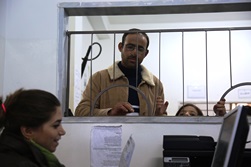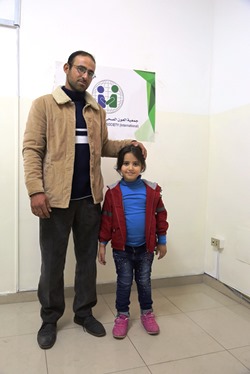Hammad fled Syria with his wife and 3 children in 2012 to escape the horrors of war. The family chose Jordan because of its relative social and political stability, compared to other countries in the Region, and because Hammad’s sister-in-law’s husband – the closest family connection outside of Syria – lives in Jordan. The family relies on health services provided by nongovernmental organization clinics, particularly for the management of Hammad’s chronic disease.
“Before the war, we lived comfortably in Dara’a and my diabetes was manageable,” Hammad says. “I had regular access to doctors, the right foods to manage my blood sugar, and my consultations and medicines were free. But medicines became very expensive in Syria – sometimes double or triple the price, and it became impossible for me to control my diabetes. We now come to clinics like this one for treatment,” he says.
Until November 2014 registered Syrian refugees were entitled to free health care services in Jordan through Ministry of Health facilities. While refugees living in camps still receive free health care, those outside of camps pay for services, around the same price as non-insured Jordanians. Although rates remain subsidized, low and affordable for non-vulnerable individuals, this has caused considerable hardship for many refugees. Nongovernmental organizations, such as JHAS, assist by providing subsidized treatment and medicines for Syrian patients.
 Hammad presents his prescription for medication at JHAS clinic. Photo credit: WHO/J Swan“On average, I pay 30 dinar (US$ 42) per month for my treatment,” Hammad says. “This is not easy because I do not have regular income. I help in a vegetable store from time-to-time, but I am often too weak to work, because of my diabetes. Al-hamdullilah (thank God) no one else in the family is sick,” he says.
Hammad presents his prescription for medication at JHAS clinic. Photo credit: WHO/J Swan“On average, I pay 30 dinar (US$ 42) per month for my treatment,” Hammad says. “This is not easy because I do not have regular income. I help in a vegetable store from time-to-time, but I am often too weak to work, because of my diabetes. Al-hamdullilah (thank God) no one else in the family is sick,” he says.
In addition to the financial burden, diet is a major challenge for Hammad.
“Sticking to low glycemic index foods is tough,” he says. “Rice and bread is cheap, and we are not able to afford too much else.”
Jordan currently hosts over 630 000 registered refugees from Syria, with about 85% of these refugees living outside camps in some of the poorest areas of the country and a significant proportion are classified as extremely vulnerable. Approximately 6% of adult refugees in Jordan suffer from diabetes.
WHO has supported the Ministry of Health and nongovernmental organizations in Jordan through the provision of noncommunicable disease medication, updating national guidelines, and through providing training on noncommunicable disease management.









